|
|
|
Sort Order |
|
|
|
Items / Page
|
|
|
|
|
|
|
| Srl | Item |
| 1 |
ID:
007129
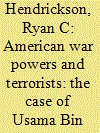

|
|
|
|
|
| Publication |
2000.
|
| Description |
161-174
|
|
|
|
|
|
|
|
|
|
|
|
|
|
|
|
| 2 |
ID:
076018
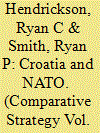

|
|
|
|
|
| Publication |
2006.
|
| Summary/Abstract |
NATO's "Open-Door" policy continues to generate much enthusiasm from aspiring countries across eastern and southern Europe. This paper examines Croatia's efforts to meet NATO's membership standards and assesses its reforms and policy changes across three issue areas, including civil-military relations, military modernization, and recent foreign policy directions. Our research suggests that Croatia has made significant improvements in moving toward NATO's political and military standards. While it still faces reform challenges due to its historical legacy under Franjo Tudjman and low public approval ratings for NATO, recent policy developments still indicate that NATO's willingness to expand produces a powerful incentive for ongoing reform.
|
|
|
|
|
|
|
|
|
|
|
|
|
|
|
|
| 3 |
ID:
120615
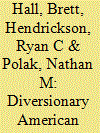

|
|
|
|
|
| Publication |
2013.
|
| Summary/Abstract |
Research on potential diversionary uses of military force continues to generate widespread scholarly attention. New measures, novel databases, and an increasing internationalization of this research examine the kinds of targets an American president may strike. Yet in many respects, Levy's insight on research of diversionary military action(s), that quantitative research approaches fail to capture the decision-making dynamics involved in a military action, has generally held true. Current analysts still struggle to develop a consensus on the conditions that help explain a diversionary military action, or whether such military actions ever even occur.
Using a diversionary-war model created from previous case-study analyses this research examines American military actions in Grenada in 1983 and Iraq in 1996 to determine whether or not these strikes appear to be diversionary in nature. Our model also employs previous research on diversionary military action to assist in the selection of American military actions, followed by a series of tests to assess various aspects of the decision-making process, international interaction prior to and after the strikes, and the strategic merits for conducting these strikes. Our research generally suggests that neither of these strikes was conducted for diversionary purposes.
|
|
|
|
|
|
|
|
|
|
|
|
|
|
|
|
| 4 |
ID:
054693
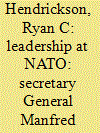

|
|
|
| 5 |
ID:
120407


|
|
|
|
|
| Publication |
2013.
|
| Summary/Abstract |
During the United States' military strikes in Libya in 2011, the debate over the authority to use force reached levels not experienced in recent American history. Many members of Congress, both Democrat and Republican, expressed concern over what they viewed as a usurpation of Congress's constitutional war powers. These concerns were exacerbated when the Obama administration maintained that it was not engaged in 'hostilities' and that the War Powers Resolution, which was intended to limit the president's war authority, did not apply to this use of force. Yet despite the strong levels of bipartisan constitutional pressure waged against the commander in chief, these efforts were generally discouraged, co-opted or simply opposed by the House and Senate leadership. This research examines the role of Congress's institutional and party leaders, specifically Speaker of the House John Boehner (R-OH), and Senators John Kerry (D-MA) and John McCain (R-AZ), and finds that their leadership was instrumental in keeping Congress's war powers authority subdued, which limited congressional interference in President Obama's military actions in Libya. Understanding these political dynamics is crucial to understanding when and how the world's sole superpower commits to overseas military actions.
|
|
|
|
|
|
|
|
|
|
|
|
|
|
|
|
| 6 |
ID:
079202


|
|
|
| 7 |
ID:
092905
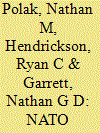

|
|
|
|
|
| Publication |
2009.
|
| Summary/Abstract |
While research on the North Atlantic Treaty Organization (NATO) and its out-of-area operations continues to thrive, very little analysis exists on NATO's ongoing membership enlargement. This article examines NATO's newest members, Albania and Croatia, and their recent efforts to transform themselves into security producers for the alliance. This research examines each state's recent military purchases, their potential geo-strategic value to the alliance, and their ability to contribute to NATO missions in Afghanistan and Kosovo. While their abilities to project force remain limited, the findings presented here suggest that these states have made measurable military advancements and bring meaningful geo-strategic advantages to the alliance, which provides additional evidence of the success of NATO's enlargement policies.
|
|
|
|
|
|
|
|
|
|
|
|
|
|
|
|
| 8 |
ID:
100409


|
|
|
|
|
| Publication |
2010.
|
| Summary/Abstract |
Anders Fogh Rasmussen is the first former prime minister to become NATO secretary general. Traditionally a role requiring behind-the-scenes diplomacy and consensus-building, Rasmussen's first year has been characterised by a break with convention. Regarded as a policy entrepreneur, his independence has reportedly provoked consternation amongst NATO ambassadors, whilst his personal media profile via Twitter and Facebook has opened the office up to public attention. Is Rasmussen a maverick or a model for the future of NATO?
|
|
|
|
|
|
|
|
|
|
|
|
|
|
|
|
| 9 |
ID:
133996
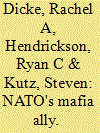

|
|
|
|
|
| Publication |
2014.
|
| Summary/Abstract |
By a number of accounts, NATO's membership expansion has been viewed favorably, with many analysts pointing to the positive impact NATO's enlargement has on the democratic development of civil-military relations across Central and Eastern Europe. Within this context, Mosès Naím's recent essay in Foreign Affairs was especially striking due to his piercing criticism of Bulgaria due to its significant problems with internal domestic corruption. We examine the potential impact of a Bulgarian mafia-oriented society on NATO from three perspectives, which include assessments of Bulgaria's military, its military capabilities-including its recent weapons purchases-as well as its willingness and ability to participate in NATO's major operations. In our view, these measures provide at least a partial assessment of Bulgaria's role within the alliance in an era that parallels claims of widespread corruption. The findings suggest that Bulgaria's corruption does have some impact on its ability to contribute to NATO's major alliance objectives, which apart from the deleterious impact on Bulgaria, also has broader implications for NATO's ongoing interest in membership expansion.
|
|
|
|
|
|
|
|
|
|
|
|
|
|
|
|
| 10 |
ID:
121002


|
|
|
|
|
| Publication |
2012.
|
| Summary/Abstract |
This analysis focuses on the three "Visegrad" states who became members of NATO in 1999: Hungary, Poland and the Czech Republic. We assess the degree of diplomatic and military support provided to the alliance by the Visegrads during NATO's military strikes on Libya. Our findings suggest that these states contributed essentially nothing to the military operation, despite calls for assistance from some contributing NATO allies. This abstention from Operation Unified Protector has larger political implications for NATO, including serious political damage to the Visegrads themselves, who now suffer more meaningfully from the free-rider critique.
|
|
|
|
|
|
|
|
|
|
|
|
|
|
|
|
| 11 |
ID:
102089


|
|
|
| 12 |
ID:
099863
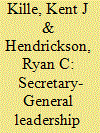

|
|
|
|
|
| Publication |
2010.
|
| Summary/Abstract |
The UN and NATO have been jointly engaged in a range of conflicts in the post-Cold War era. Studies of these organizations, however, have largely overlooked the institutional interplay between their Secretaries-General. After brief reviews of the relationship between the UN and NATO and the leadership role that a Secretary-General can provide, this article examines the political relationship between Kofi Annan and Javier Solana across three stages of NATO's 1999 Operation Allied Force in Kosovo. The findings show the important roles played and coordinated effort supplied by the Secretaries-General. This provides new perspectives on UN-NATO institutional coordination and has important implications for considering the relative security roles to be played by the UN and NATO in the future.
|
|
|
|
|
|
|
|
|
|
|
|
|
|
|
|
| 13 |
ID:
098387


|
|
|
|
|
| Publication |
2010.
|
| Summary/Abstract |
Despite the presence of a new American Commander in Chief in Barack Obama in 2009, the use of military force abroad remains a staple of American foreign policy. This article examines the constitutional war powers political environment of the Obama presidency, which seeks to explain how the Obama administration perceives its constitutional authority to use force abroad. The article examines President Obama's and Vice President Joseph Biden's previous views on war powers while they served in the United States Senate, and in addition assesses two cases of President Obama's military actions, including examinations of Obama's military policymaking on Afghanistan and Obama's decision to authorize the US Navy Seals' use of force against Somali pirates in 2009. The findings suggest that despite having substantial records in the US Senate of supporting meaningful consultation between the Congress and the President prior to new military action, the Obama administration has acted much like previous Commanders in Chief, who made little effort to consult with Congress. In addition, in contrast to some current war powers scholarship, congressional Democrats have proven most likely to challenge the commander in chief, as most members of Congress have deferred to Obama's leadership. These findings indicate that Congress is unlikely to serve as a significant institutional check on President Obama as commander in chief, and that much like the Bush presidency, the centre of American military policymaking will remain at the White House and not the American Congress.
|
|
|
|
|
|
|
|
|
|
|
|
|
|
|
|
| 14 |
ID:
086637
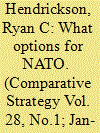

|
|
|
|
|
| Publication |
2009.
|
| Summary/Abstract |
Much research on the North Atlantic Treaty Organization laments Europe's limited military capabilities and low defense spending trends. Much less recent analysis, however, has been devoted to specific European member allies and the extent to which they have individually sought to transform their own national military capabilities to comport with NATO's broader security needs. This research finds that while the Netherlands makes significant military contributions to NATO's mission in Afghanistan and other peacekeeping operations, and has taken some steps to improve upon its existing force projection capabilities, important limitations exist on how much additional military assistance it will be able to provide to the allies, both in the short and long term.
|
|
|
|
|
|
|
|
|
|
|
|
|
|
|
|
|
|
|
|
|